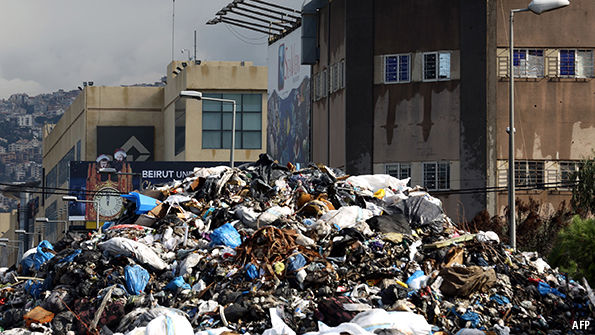
WHEN is a crisis really a crisis in Lebanon? It can be hard to tell. With the country’s vibrant commerce, entrepreneurial buzz and relatively liberal social scene, it can be easy to overlook the rot underneath. The tiny nation of 4m regularly goes for stretches without a functioning government. Since the civil war ended 25 years ago residents have endured power shortages and woeful public services. And things are getting worse.
On the country’s Independence Day on November 22nd, marking 72 years since French rule ended, protests, which had just about ground to a halt after a summer high, drowned out the celebrations. Lebanon broke its own record for longest period without a president—546 days. Local papers now use the plural, writing of the country’s “crises” rather than “crisis”.
Hitherto the most obvious breakdown has been in public services. Water tankers line the streets since the piped stuff reaches few areas of the capital. No community will accept the government’s proposed new landfill sites for the rubbish that has accumulated on the streets for the past few months. Now the rains have come, the refuse, which includes used toilet paper, is floating in all directions before being washed into rivers.
The economy has been buffeted by the conflict next door in Syria, Lebanon’s only neighbour other than Israel, with which it is nominally still at war. Partly because of the strain of housing over 1m refugees—one for every four Lebanese—debt now stands at 131% of GDP.
Even more worrying is the security situation. Islamic State (IS) claimed its first attack in the country on November 12th when it detonated two bombs in a suburb of the capital. The country is awash with guns and disillusioned young men. Up in Mount Lebanon, a Christian stronghold, locals fret over the jihadists’ reach.
The underlying problem is politics. Under Lebanon’s system, seats in parliament and posts in government are shared out by sect rather than competence. This has, unsurprisingly, produced incompetent government. And now the system is under pressure. Partly that is because, despite the lack of a census, everyone knows that the make-up of the country is very different from what it was when the system was set down. Muslims are reckoned to far outnumber the Christians now, though they are allocated the same number of parliamentary seats.
Political talks continue, but few Lebanese are holding their breath. A large part of the problem is that the many warlords now reincarnated as politicians seem more interested in protecting their own power bases than in the good of the country. Last month, in a remarkable show of political immaturity, one of the main parties threatened to shut Beirut’s water off.
The security services, the one vaguely functional part of the state, are carrying out raids and have arrested those suspected of planning terror attacks. But many fear the terror plots will be used as an excuse to crack down on Syrian refugees. It is easy to sympathise with the difficulty of trying to host 1m guests. Yet if Lebanon’s politicians spent more time focusing on their own failings rather than blaming others, things might work out better for all.



